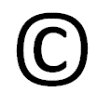I hope you find my writing and business tips and observations useful. My business and blog are dedicated to helping businesses communicate clearly and reach their potential.
Read, subscribe to my newsletter, enjoy!Tash
who owns the copyright?
Although I am not a lawyer and copyright is a complex area of law, I get a number of questions about copyright. Recently, I was asked about the ownership of content when a contractor writes something for a business and which entity would be listed in a copyright notice.
 Generally, if you create something you own the copyright unless you assign it (in writing with a signature) to someone else. So if your agreement with a client doesn’t specify otherwise, you own the copyright in general terms.
Generally, if you create something you own the copyright unless you assign it (in writing with a signature) to someone else. So if your agreement with a client doesn’t specify otherwise, you own the copyright in general terms.
You can assign a client the copyrights to use the material in certain ways – but perhaps limit them from owning other rights (e.g. international or movie rights) There does not have to be an exchange of money to exchange copyright – but it is something worth setting a price for commercially. Once you assign copyright to them, they own the copyright on the material under those stated conditions and thus only they would be on any copyright notice.
If you are an employee or a contractor under certain circumstances, the company owns copyright even if you are the creator. For contractors, this usually includes an agreement or expectation between you and the company, and may apply if they have initiated the work and paid you for all your time working on the project.
If a client owns the copyright, they don’t have to include your name in a copyright notice; if you own it, it is more likely that your notice would state ‘copyright owned by Justine and assigned to XYZ’ or equivalent.
Note that you will ALWAYS own the moral rights to the materials as these can not be bought or given away. This means that they can not represent the work in way that is negative towards you, deny it is written by you or adjust it and still call it yours.
When preparing a quote and agreement for companies, take copyright into consideration. Some of the things I write are useless to me anyway (e.g. a resume for someone else) so copyright isn’t worth fussing about, but if I write an article then copyright becomes a bigger issue and I charge more to give the other party full copyright over it.
Who owns copyright and how it is publicly presented depends upon the arrangement between you and a specific client. And not being a lawyer, I can’t give you a definitive answer but hopefully the above helps. Try www.copyright.org.au and get a copyright lawyer’s details from them if copyright becomes an issue for you.
Outsourcing in between jobs
Not every job or business is suited to outsourcing and using contractors – for various reasons that we won’t go into right now. But what happens if no one is able to do the job in-house for a while?
Recently I did some work for a company while they were searching for a full-time technical writer. Being in the wrong city and unavailable for full-time work, I wasn’t going to apply for the job but I was able to help them while they looked for a new person for the role.
In this case, I set up some procedure templates and introductory documents (including standard emails for the team to use when sending information to the new writer), as well as editing the rough procedures the programmers had written down.
So don’t assume you can’t use outsource a project temporarily while you find the right person to work in-house – hiring an outsider can reduce a lot of the pressure to hire which can result in choosing the first possibility rather than waiting for the right person.
Even if a contractor can’t do the full job, especially if working remotely is an issue, you may find they can help with the following aspects of a role:
- preparation work for a new project or role – whether that is to set up the accounts, write the procedures, set up a schedule, organise physical requirements or do some initial research
- some mundane aspects of the role, such as data entry, editing existing materials and reviewing older materials are compliant/consistent
- doing tasks for other team members so they can cover for the empty position (for example, preapring newsletter content could be outsourced to a writer so the admin manager is free to prepare invoices until a new bookkeeper is appointed)
What else could be outsourced as an interim measure in your business?

Recent Comments